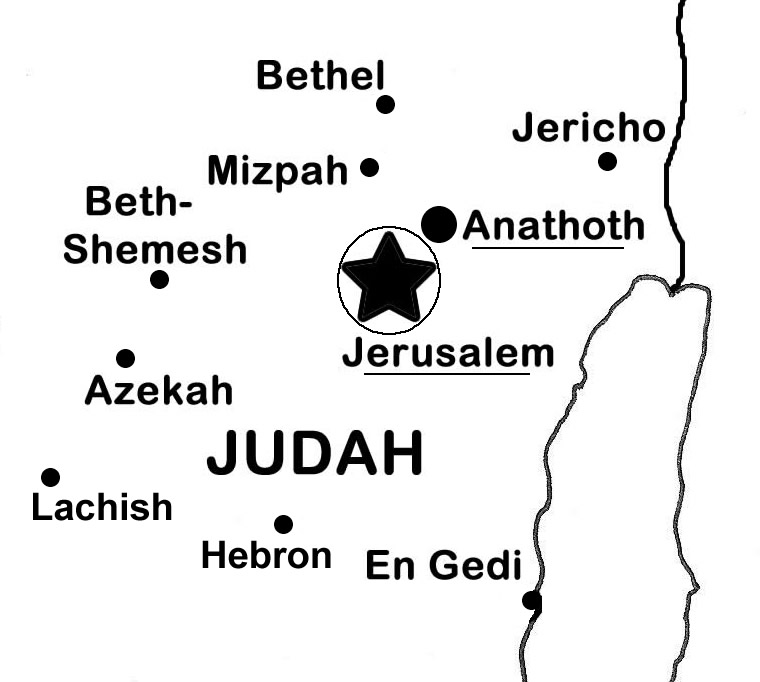15. Running With The Horses
The word that came to Jeremiah from the Lord:“Hear the words of this covenant, and speak to the men of Judah and the inhabitants of Jerusalem. You shall say to them,‘Thus says the Lord, the God of Israel: “Cursed be the man who does not hear the words of this covenant that I commanded your fathers when I brought them out of the land of Egypt.”’” - Jeremiah 11:1-4
It appears this prophecy was given shortly after the “Book of the Law” (known to us as Deuteronomy) was found during a renovation of the temple during Josiah’s reign in 623 BC (2 Chr. 34:8-13; 2 Kings 22:3-7).
In it, Jeremiah called the people of Jerusalem to hear and obey the words of the covenant - which would have been Moses’ words from 1405 BC that were spoken and sung to the second generation in the wilderness before they crossed the Jordan to enter the Promised Land. These words - described by Jeremiah as “the words of this covenant” - were recorded in the book of Deuteronomy, but they had been mistreated, replaced, and misplaced by the priesthood in Judah by the time of King Josiah (640-609 BC). Soon after the discovery of this document in 622 BC, while Josiah was working toward national reformation, these words were made public. They were read aloud to the people, and the priests were instructed to obey them:
Then the king (Josiah) sent, and all the elders of Judah and Jerusalem were gathered to him. And the king went up to the house of the Lord, and with him all the men of Judah and all the inhabitants of Jerusalem and the priests and the prophets, all the people, both small and great. And he (Josiah) read in their hearing all the words of the Book of the Covenant that had been found in the house of the Lord.- 2 Kings 23:1-2
And the king commanded all the people, “Keep the Passover to the Lord your God, as it is written in this Book of the Covenant”…Moreover, Josiah put away the mediums and the necromancers and the household gods and the idols and all the abominations that were seen in the land of Judah and in Jerusalem, that he might establish the words of the law that were written in the book that Hilkiah the priest found in the house of the Lord.- 2 Kings 23:21, 24-25
The prophet Jeremiah joined with Josiah to increase the people’s knowledge of the Book of the Covenant, but according to the Lord’s word to Jeremiah, some of the people of Jerusalem and Judah were not hearing or obeying it. So, Jeremiah spoke for God to the people. Jeremiah was speaking in support of Josiah’s efforts to bring reform to the culture only 36 years before the city and temple were totally destroyed by the Babylonians in 586 BC.
Jeremiah was one of the priests who lived with his family in the town of Anathoth, a priestly town just two miles northeast of Jerusalem on the other side of the Kidron Valley. When Jeremiah began to support Josiah and proclaim his prophecies he was rejected by his fellow priests and, and even by his own family in Anathoth. The priests continued to oppose the written Word of God that had been given to them by Moses, but now they began to also reject the prophetic Word of God spoken by Jeremiah to call the nation back to the written Word.
In fact, the priests, including Jeremiah’s family in Anathoth, were so embarrassed by Jeremiah’s ministry that they demanded he stop. They threatened to kill him if he continued to bring disgrace on their family and their reputation.

Thus says the Lord concerning the men of Anathoth, who seek your life, and say, “Do not prophesy in the name of the Lord, or you will die by our hand.”- Jeremiah 11:21
The priesthood was a very lucrative “business” to be involved with. Even in Jesus’ day the priesthood consisted of the wealthy elites who persecuted and oppressed those who did not cooperate with their stranglehold of control on society, the temple, and the profits made on the sacrificial system. (Remember Jesus turning over the tables of the money changers in the temple while quoting Jeremiah’s words from Jeremiah 7:11: “‘Has this house, which bears my Name, become a den of robbers to you? But I have been watching!’ declares the Lord.”)
Jeremiah was putting his life at risk by breaking rank with the priests and his own family’s priestly “business”. Even though the priests had managed to lose and replace the words of the law of God by 623 BC, they had not lost, renounced, or replaced themselves as overseers and beneficiaries of the sacrifices and offerings (food, drink, money, clothing, and other possessions) brought to them by the people, which the words of the law of God had prescribed. In other words, the priests had kept the benefits, but discarded the purpose.
The priests were still getting paid, but were not doing the work. In fact, the priests had expanded their temple “business” by opening new locations at many shrines and high places on the street corners of Jerusalem and in towns across Judah (Jer. 11:13; 2 Chr. 28:24-25). This priestly business had been very, very good to Jeremiah’s priestly family, but now Jeremiah was acting out of line with the priestly business policies. By condemning the cultic high places and calling the people back to the “words of the covenant”, Jeremiah was not being politically correct.
At first, Jeremiah was blindsided by the priesthood’s rejection of his ministry. In Jeremiah’s thinking it was unfair for the priesthood to come against him just because he was actually doing the work of the Lord and proclaiming the Word of the Lord. Jeremiah complained to God saying,
I was like a gentle lamb led to the slaughter.I did not know it was against me they devised schemes, saying, “Let us cut him off from the land of the living,That his name be remembered no more.”But, O Lord of hosts, who judges righteously, who tests the heart and the mind,Let me see your vengeance upon them, for to you have I committed my cause.- Jeremiah 11:19-20
The Lord responds to Jeremiah’s prayer by declaring that he will bring judgment on the people of Anathoth (Jer. 11:22-23), but it will happen in “the year of their punishment” (11:23) - not right away. Jeremiah will have to continue his ministry while opposition from the priesthood continues as well. Jeremiah’s cry for justice will have to wait until the Lord is ready to bring judgment to the false priests.
Hearing this, Jeremiah then followed up with another complaint, asking again that those opposing his ministry be eliminated. He begins by appealing to God’s righteousness - the characteristic of God that would most surely understand Jeremiah’s oppression at the hands of the ungodly. Jeremiah asks the Lord why the wicked still prosper in their corrupt priestly “business” while he suffers:
Righteous are you, O Lord, when I complain to you; yet I would plead my case before you. Why does the way of the wicked prosper?Why do all who are treacherous thrive?- Jeremiah 12:1
Jeremiah tells the Lord that while those who oppose him seem to serve him, it is in appearance only, and they are actually far from him. Jeremiah compares himself to these godless men and reminds the Lord that his heart is very close to him. The Lord knows Jeremiah’s heart, because the Lord has tested him. According to Jeremiah’s logic, since there is such a stark difference between the evil oppressors and himself, the Lord should simply do away with them:
You are near in their mouth and far from their heart.But you, O Lord, know me; you see me, and test my heart toward you. Pull them out like sheep for the slaughter, and set them apart for the day of slaughter.- Jeremiah 12:2-3
The Lord’s reply was not as sympathetic as Jeremiah had hoped. In fact, it came back as an accusation of Jeremiah’s failure to endure. The Lord challenged Jeremiah to step up his game, because there were bigger battles to be faced than dealing with mere men who were masquerading as priests while making vain threats toward God’s prophet. The Lord tells Jeremiah:
If you have raced with men on foot and they have worn you out,how can you compete with horses?If you stumble in a safe country, how will you manage in the thickets by the Jordan? - Jeremiah 12:5
In his response, the Lord points out Jeremiah’s weak endurance and shaky stability - especially considering the promises that God had given him. The mere words of the wicked priests were driving Jeremiah’s soul out of God’s rest and causing him to stumble into the captivity of their false reality. Even as a man of God, given the strength and rest of God, Jeremiah was failing to remain in that place of strength and rest. He was instead, entering the competition as a mere man “racing” against other mere men. The Lord’s intention for his prophet was that he be strong and confident in the power of the Lord - and from that place of strength and rest be able to successfully run even with horses (just as Elijah had - 1 Kings 18:45-46).
The Lord also points out that Jeremiah was stumbling even on a relatively smooth road merely because of some verbal threats. What would Jeremiah do when those threats became physical and involved public mocking, stocks, prison, deep pits, and starvation? The Lord asked his prophet, “if you stumble in safe country, how will you manage in the thickets by the Jordan” - where the land was dangerous, overgrown with thick vegetation like a jungle, and a home to lions?
Jeremiah was stumbling from just the small amount of opposition he faced in 622 BC - but he would have to continue to speak reality and truth to his generation for another 36 years, as the society continued to decline into deeper and deeper social oppression. And then, after four hard decades of his ministry being rejected, the Babylonians would finally arrive to burn the city and temple. The events Jeremiah would face in the coming years would be nothing compared to a few threats from the priests and want-to-be prophets who opposed him early on.
The Lord concludes his rebuke with some inside information that Jeremiah had not fully understood. Apparently Jeremiah had figured out that the priests of his hometown of Anathoth were against him, but what he didn’t know was that he could not even trust his own family. The Lord tells Jeremiah that even if his relatives speak well of him in public, they are not to be trusted, because some of them had already betrayed him and were crying out against him:
Your relatives, members of your own family— even they have betrayed you; they have raised a loud cry against you.Do not trust them, though they speak well of you.- Jeremiah 12:6
This was not the only time the Lord would need to remind Jeremiah to return to his place of peace, rest, and strength. For years, Jeremiah continued to proclaim the Word of God to his generation, encouraging friends, family, kings, priests, prophets, and the public to trust the Lord and obey his Word. Jeremiah was able to remain faithful to his calling because he made a practice of constantly returning to the place of God’s rest in his soul and maintained the fortress of the knowledge of God in his mind - no matter what the response to his preaching.
Thus says the LORD:“Stand by the roads, and look,and ask for the ancient paths,where the good way is; and walk in it,and find rest for your souls.”But they said, “We will not walk in it.”- Jeremiah 6:16

